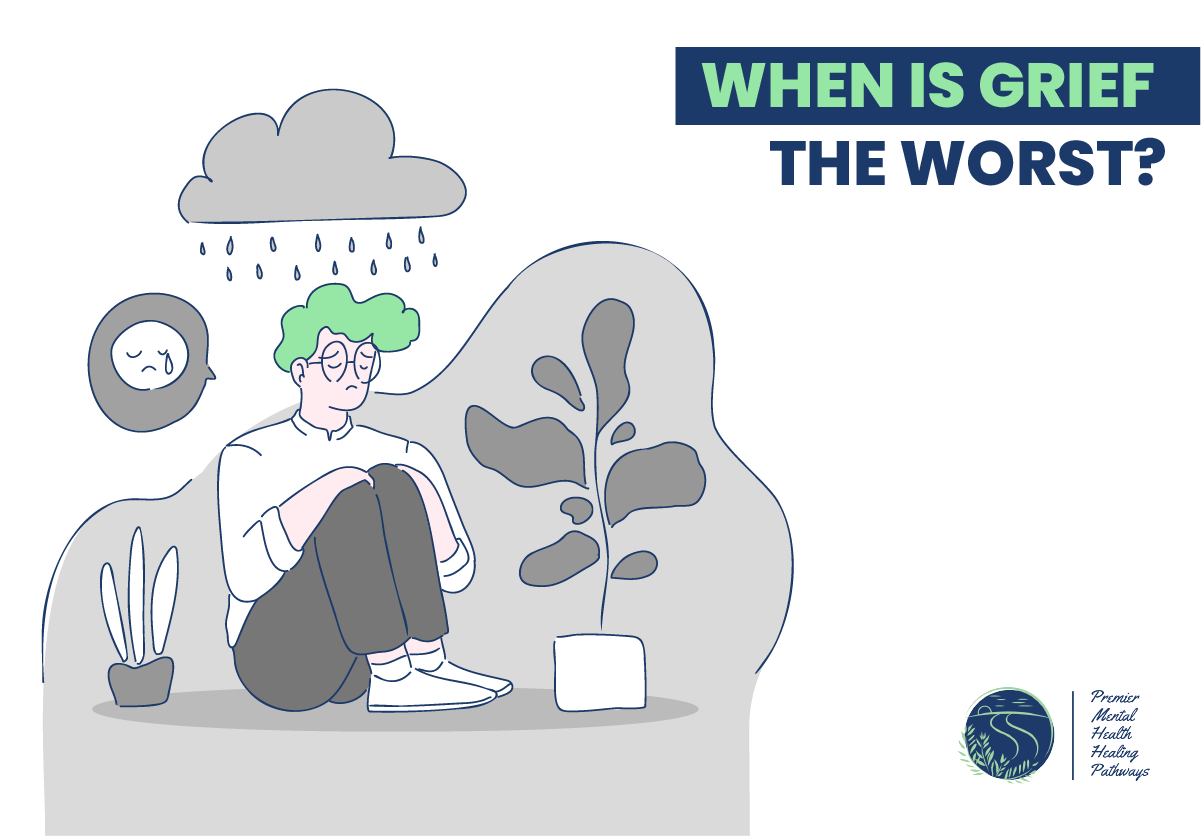We are never ready to lose a loved one, whether it is through death, divorce, or just moving away. The grief that comes with loss is overwhelming. It does not go away quickly most of the time, either.
Do you want professional help for you and your loved one? You can go to Premier Mental Health Healing Pathways for grief and bereavement treatment.
You may wonder, “How long does grief last?” During a tough time like this, no one has all the answers.
We will discuss when is grief the worst?
Does Grief Ever Go Away?
It is hard to say if grief goes away for good, just like it is hard to say, “how long does it take you?” But, yes, for many people, the grieving process does end as they come to terms with their loss and find ways to make their lives feel whole again.
During this rough time, grief counselling can be beneficial. This depends on many things, even how the person sees the event that caused the grief.
While some people think that you are “not grieving” once you are past the acute stage of grief or mourning, others see the grieving process as something that will always be with you and that gets easier to handle over time. Some people may feel numb for a while.
From a clinical point of view, someone can “fully recover” from a grief event even if they do not show any grief symptoms that would be considered an emotional disturbance.
How Long Do People Keep Grief?
Most people go through the grief process at least six months after a death or other major loss.
Grief can last for years for some people.
Grief is different for everyone because it depends on the event, the person, and the resources that person had at the time of the loss.
Why Does Some Grief Last Longer?
How the grieving process goes can be affected by how close the person was to the person who died, a sudden or traumatic loss, the person’s own past, and other stressful events in their life.
Some common emotions that come with grief are:
- Feeling of being empty
- Being unable to feel joy
- Having trouble eating or sleeping
- Having angry thoughts
- Feeling sad
When Does Grief Get the Hardest?
The hardest part of grief is different for each person and each loss. Most people say that the hardest part of grief is getting to the acceptance stage, but the steps are not always in that order.
A lot of different methods list a range of stages. But here are seven common stages of grief:
- Shock and Denial: You might feel numb or unable to believe what happened at this point. Some of the most common feelings that happen at this stage are sadness, confusion, and grief.
- Pain and Guilt: You may feel bad about what you did or did not do for your loved one, like guilty about what you said or feeling like you did not say enough. It may be too hard to handle the death of a loved one, and life may seem scary at this time. Feelings that people often have at this stage are hopelessness, sadness, and guilt.
- Anger and Bargaining: During this stage, you might lash out at loved ones, blame others for how you feel or what happened, or pray to God or a higher power to make your painful feelings go away. You might feel especially angry or resentful during this time.
- Depression: During this stage, you may feel alone, sad, lonely, and reflective as you struggle to deal with your loss. When you are depressed, you might feel a lot of strong emotions, like sadness, emptiness, and heaviness.
- The Positive Turn: People feel calmer and more relaxed at this point, and their anger and depression start to fade. You may also start to feel more motivated and fuller of energy.
- Rebuilding and Working Through: This is when your mind will start to really get better. You start to feel like you can handle life again, and you start to connect with people you care about again. It gives you more drive and energy, and you might start to feel better about the future.
- Acceptance and Hope: In the end everything you cared for will be consumed, you start to accept the truth of things and focus on hope and the future. Acceptance is a slow process, so this phase will not show up all at once. It is all an important part of getting over grief and getting used to a new life.
When Is Grief the Worst?
It depends on the type of loss, the person’s ability to get help, and how close they were to the loss to determine how hard the grieving process is for them.
A lot of the time, traumatic events that cause grief are linked to symptoms that are worse and last longer than simple symptoms of grief.
If someone is going through traumatic grief, they often lose someone quickly and without warning. They have had little or no time to get ready for this loss.
Telling someone they are going to experience grief, like they have a terminal illness, can make it harder for them to heal. This is called anticipatory grief.
How to Get Over Your Loss and Start Moving On?
There are a few things you can do to deal with your loss and move on:
- Feel free to tell those close to you about your loss and pain. Do you trust a close friend or family member enough to tell them everything? There is no better way to deal with your feelings than to talk about your loss and how it makes you feel.
- Think about all the good things in your life and what you still have. Without a doubt, you are in a terrible and painful situation, but that does not mean everything in your life is bad. Remember all the good things that are still there and find comfort in them.
- Take some time to do the things you love. At first, it might be hard to get back into some of your old habits, but it is important to keep doing the things you enjoy, like running, dancing, painting, knitting, reading, or just hanging out with friends.
- You might want to talk to a grief counsellor. There are people who can help you deal with your grief and make peace with your loss so that you can move on with your life.
In Conclusion, When Is Grief the Worst?
Grief is a very personal feeling that is different for everyone and every loss.
How bad the grief is and how long it lasts depend on things like the type of loss, the support that is available, and the ways that the person is coping.
There may not be a clear answer to the question of when grief is at its worst, but recognizing its stages and getting help can help you get through the pain and start the process of healing and accepting what happened.
Remember that it is okay to get help from a professional and lean on friends and family during this tough time.
FAQs
When should grief end?
Grief does not have a set time or date. After someone you love has died, it is normal to feel very sad for more than a year, and sometimes for many years. Do not force yourself to get better or move on just because other people say you should
Grief counselling support groups near me?
To find mental health services online, you can use search engines or specialized directories. Also, you can ask mental health groups, hospitals, community centers, or religious groups in your area about grief support groups that meet in your area.






No comment